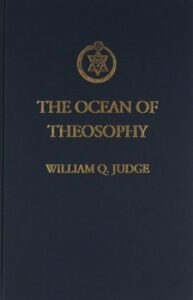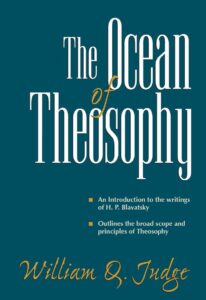Studies In The Ocean of Theosophy Part XII
Theosophy Magazine
Vol. 21, No. 12 October 1933
pages 560-561
Part XII
IN chapter one of the “Ocean,” the statements regarding the Masters of Wisdom afford a glimpse of Divine Intelligence. The following five chapters throw the light of this Intelligence upon the fields of being, revealing unsuspected departments of them and showing deeper meanings in their familiar aspects.
The lower and transient having been set forth, chapter seven takes up the higher and eternal part of man’s nature: the presentation of Mind draws attention once more to intelligence itself. Common enough in the West is the use of the word “Mind.” There is talk of “making up” the mind, of “charging” it with tasks of memory, and of “changing” it. Reference is made to minds, weak or strong, brilliant or dull, reasonable or stubborn, broad or narrow; but what mind is —who is prepared to say? Ordinarily, it “is thought to be immaterial, or to be merely the name for the action of the brain in evolving thought”. Strange theories and grotesque arguments, based upon this view, are offered. But from them all sticks out the obviously weak point as to just how the material could give rise to the immaterial. Around this point, modern reasoning has worn a detour of sophistry. Along this bend in the road of common sense, the layman is expected to tread his lowly way with averted gaze and no questions.
Throughout the Occident, a “good deal of attention has been paid to cataloguing some mental functions and attributes”. This passes for “psychology”; but so lacking is basic comprehension of Mind that “the terms are altogether absent from the language to describe actual metaphysical and spiritual facts about man.” So-called Religion and recognized Science are no less irrational and unfair: one exacting “faith” deliberately blind; the other refusing to acknowledge the Soul of things and translating her profoundest discoveries into terms of sense-perception.
When, a half century ago, the clash came between Religion and Science and they went divergent ways, the general public ceased to take either of them very seriously, and now, ever crescendo, turns its attention to gratification of its desires. The popular philosophy would seem to be: “Nobody knows the facts about life; but we do know how to derive pleasures from it. What more do we want!” Thus does the mass of Humanity steadily tend towards satisfaction in the very dregs of Kama.
Where Kama reigns supreme, with its confusion and poverty of ideals, “confusion and poverty of words” necessarily obtain. When Theosophy came to the rescue of the Western nations, little could be found suitable to clothe its message of the higher life and search was made, in vain, for “the words needed for describing the fifth, sixth, and seventh principles, those which make up the Trinity, the real man, the immortal pilgrim.” For this purpose, Sanscrit terms were introduced, accompanied by copious explanations in English. Once assimilated into the language, these will yield up at least a part of their significance to the earnest seeker.
In the classification chosen, Mind is designated as Manas, better expressing its tremendous depth and scope and establishing it as a substance Principle — the fifth — in Man. For “it is the knower, the perceiver, the thinker,” independent of brain, but the producer of the brain as an instrument for functioning on the physical plane. Of the two higher Principles, the “sixth is Buddhi, or spiritual discernment” — Manas being its active aspect; “the seventh is Atma, or Spirit, the ray from the Absolute Being,” using Buddhi as its vehicle. “The English language will suffice to describe in part what Manas is, but not Buddhi, nor Atma and will leave many things relating to Manas undescribed.” Nevertheless, mention would scarcely have been made of these had all approach to their meaning been hopeless. Well may it be that when the mind succeeds in weakening the bonds of Kama, intuitive flashes may begin to enlighten it concerning Buddhi and Atma.
The pondering of these great subjects makes it ever clearer why H.P.B. said She came “to break the moulds of men’s minds”. Among the innumerable moulds to be broken, are the personal-god idea — providing patterns for all the rest — physical beinghood, one-life perspective, dead matter, non-intelligence anywhere, chance, and separateness. Not one of these but lies shattered when apprehension is gained of Theosophy’s sane teachings of the universality of Life, spiritually and potential god-hood of all beings, innate intelligence, inherent law and order, Karmic responsibility, eternal hope through Reincarnation, and Universal Brotherhood.
Universality of Life implies living, boundless Space, with no tiniest spot where intelligence is not unfolding, forever straining forward towards higher and fuller expression. For “Life”, the word “Monad” is often substituted. And it is taught that “without the presence of the monad, evolution could not go forward.” For the monad is the evolver, wherein reside all powers, forces, processes, and designs involved in the long spiral of progress from mere Consciousness, to self-consciousness, thence to Divine Self-Consciousness — the three main stages of the journey.
During the early rounds, the “course of evolution developed the lower principles and produced at last the form of man”. “But this man in form was not man in mind”, lacking “the fifth principle, the thinking, perceiving one”, needed “to confer the power of becoming self-conscious.” Prior to this, the imprisoned monad, “composed of Atma and Buddhi”, with Manas potential, could act only in response to direction from the self-energized Monads. This response, known doctrinally as “natural impulse”, proceeds in unbroken continuity, up to the incipient human stage. There, “natural impulse” ends; but between it and the assumption of “self-induced and self-devised efforts”, there lies an abrupt break in the evolutionary path. The bridging of this abyss is an extreme philosophical profundity, meriting reverent approach and requiring patience for its understanding. It must be inferred that this mystery requires the light of Soul for its solution; for the teaching states that the awful gulf is spanned by Mind, “the link between the Spirit of God above and the personal below”; and that this bridge is an endowment — “given to the mindless monads by others who had gone all through this process ages upon ages before in other worlds and systems of worlds, and it therefore came from other evolutionary periods which were carried out and completed long before the solar system had begun.”
If this transmission seems a “theory, strange and unacceptable today”; the fact but gives evidence of how deeply the spark of Divine Intelligence lies buried under the materialism of our age. It bears witness to the inferiority of the proud Western man to the Ancient whom he derides. For those of old symbolized no theory, but a recognized fact, in “their sacred fire — lighted from some other sacred flame.”
The giving of Mind militates no whit against the doctrine of universal intelligence. Without Manas potentially present, the bestowal could not take place. Yet, however ready, the light could not shine forth unless potential self-consciousness were quickened by the higher Potency. This process is no stranger than the familiar act of lighting a fire. It is latent fire that permits ignition of the wood; but latent fire could never stimulate itself into action. In both metaphysical and physical processes, something — yet no thing —is imparted, without increase to recipient or decrease to transmitter. Outer force and inner force blend. The spirit of fire in the blazing torch touches the spirit of quiescent fire in the fuel, inducing it to activity. Even so, the spiritual Fire of the self-conscious Monad, touching the spirit of the slumber-monad, arouses it to burst the bonds of ignorance and know itself. Small wonder the symbol of “one candle lighting many” is used “in all great religions and Freemasonry.” “The mindless men — are the unlighted candles that cannot light themselves”, while the “Sons of Wisdom — the Elder Brothers — have the light.” They set fire to the combined lower principles and the Monad, thus lighting up Manas in the new men and preparing another great race for final initiation.”
The transmission of this fact to Man should quicken the flame of aspiration and devotion in his heart; for its wondrous implication is that individual power to think is a gift direct from higher beings. This not only proves spiritual identity with Them, but indicates the definite, intimate residence in everyone of a spark of Masters’ subtle, mysterious, conscious Energy — a boon, given in trust, to be fostered and employed in furtherance of Their Cause — the raising of all Nature. To betray such trust is to steal the Mahatmic Fire and delay Their purpose of preparing the race “for final initiation”.
Thought of this sacred gift should inspire each to higher potencies of the Fire of Knowledge. For it is not enough for Man to know that he is. He must learn what he is and why. Perhaps, then, when Manas is warmed and illumined by Buddhi, it will be found that Self-realization is another term for conscious Brotherhood.
COMPILER’S NOTE: The following is a separate item which followed the above article but was on the same page. I felt it was useful to include it here:
THE HIGHEST VISION
A man’s idea of God, is that image of blinding light that he sees reflected in the concave mirror of his own soul, and yet this is not, in very truth, God, but only His reflection. His glory is there, but, it is the light of his own Spirit that the man sees, and it is all he can bear to look upon. The clearer the mirror, the brighter will be the divine image. But the external world cannot be witnessed in it at the same moment. —Isis Unveiled, I, xviii.
Back to The Ocean of Theosophy



